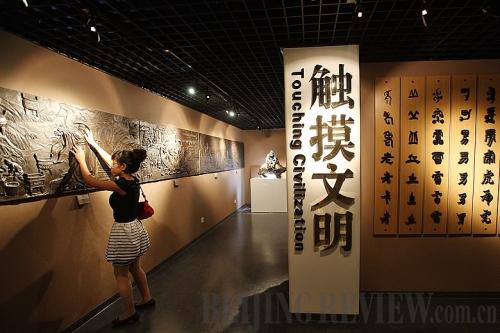|
 |
|
TOUCHING ARTWORKS: A visually impaired woman touches reliefs of famous paintings in China Braille Library on June 28 (WAN XIANG) |
For more photos please click here
Yu Shixiang, a visually-impaired masseur of traditional Chinese medicine, is a bookworm living in Beijing's Mentougou District.
On the early morning of June 28, Yu, accompanied by his family, came to the new location of the China Braille Library (China Culture & Information Service Center for the Visually Impaired) in downtown Beijing on its opening day.
Covering an area of 28,000 square meters, the library houses a number of reading areas and assistant technologies. The library boasts a collection of Braille books on a variety of academic subjects such as social sciences, art, literature, science, technology, and medicine. There are page magnifiers for readers with limited vision, an area for listening to audiobooks, an area with electronic Braille output displays, and a general reading area for traditional Braille books.
Upon entering the reading area, Yu found the desk was suitable in height with a groove on it to place his walking stick.
"The facilities are considerate of us," Yu said.
In the electronic reading area, Yu quickly figured out how to use the electronic Braille reading device. He put a memory card into the device after scanning a page of an ordinary book. The device encoded the scanned text into Braille and displayed it with a matrix of dots that dynamically raised themselves through holes in a flat panel for Yu to read with his hands.
"With this tool, I can read books just like ordinary people!" Yu said excitedly.
Sun Binghe, 10, a student from the Beijing School For the Blind, was reading The Dark Frigate on a computer designed for the visually impaired in children's reading area. He touched the tactile Braille display device and read it aloud.
"It's a fabulous adventure story," Sun said. "My school has some books for electronic reading, but not as many as here. I'd like to come here frequently."
Besides reading areas, an exhibition area was set up inside the library. Sculptures of great thinkers including Confucius and Socrates, reliefs of famous paintings like The Grand Ceremony for the Founding of New China and The Last Supper, as well as replicas of classical architecture like the Arc de Triomphe and the pyramids, were on display for the visually impaired to learn about human civilization through tactile senses. Headphones are available for visitors as well.
In addition, the library offers training services, including vision therapy, psychological consultation, computer training, music classes and descriptive video service.
"We appreciate the country for building such an advanced Braille library," said Li Zhijun, President of the Chinese Association of the Blind. "It is a big encouragement for people with visual difficulties to keep learning and participate in social activities for self-fulfillment."
China has 12.33 million visually impaired people, and learning tends to be the most difficult thing in their lives due to a lack of accessible facilities.
"Having this wonderful library, visually impaired Chinese people can improve their capabilities with knowledge, overcoming the information blockade caused by high-tech development, and have a better life," said Zhang Haidi, President of the China Disabled Persons' Federation, at the opening ceremony.
(Source: Xinhua News Agency) | 